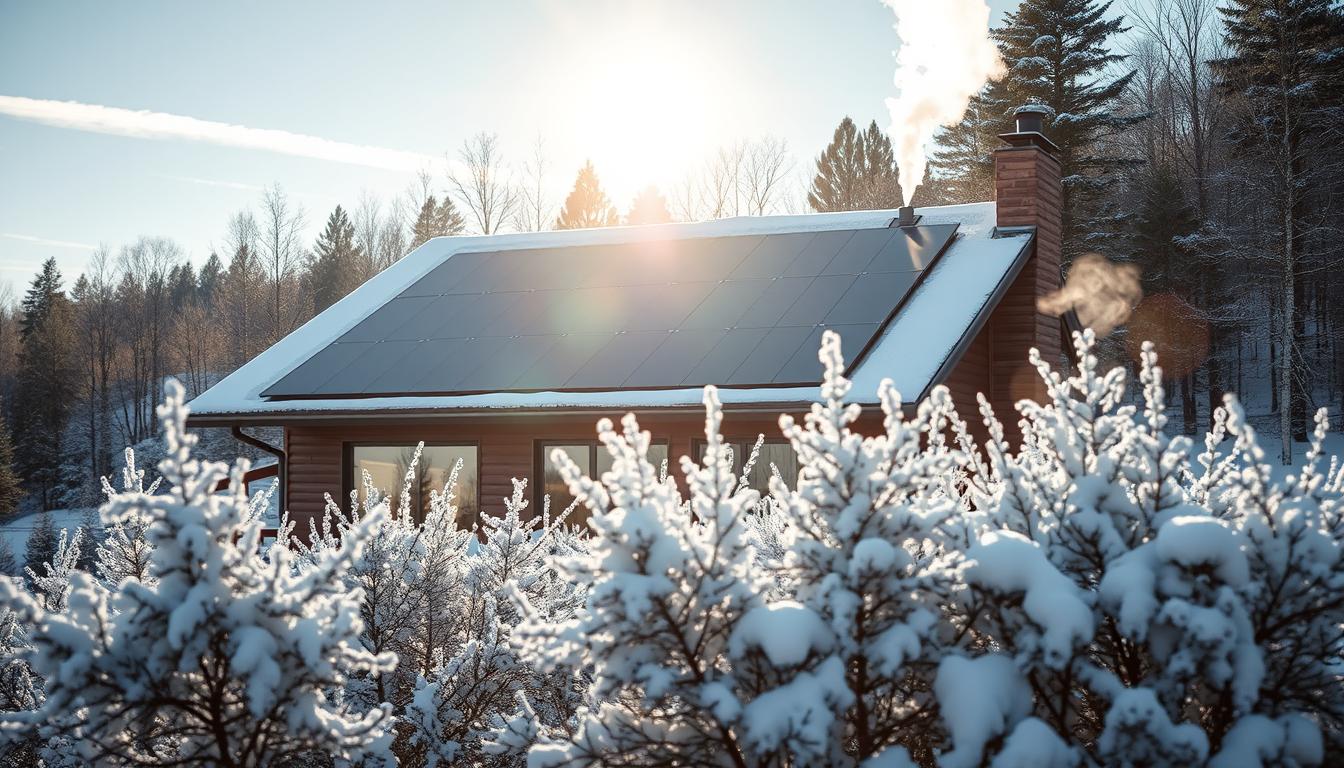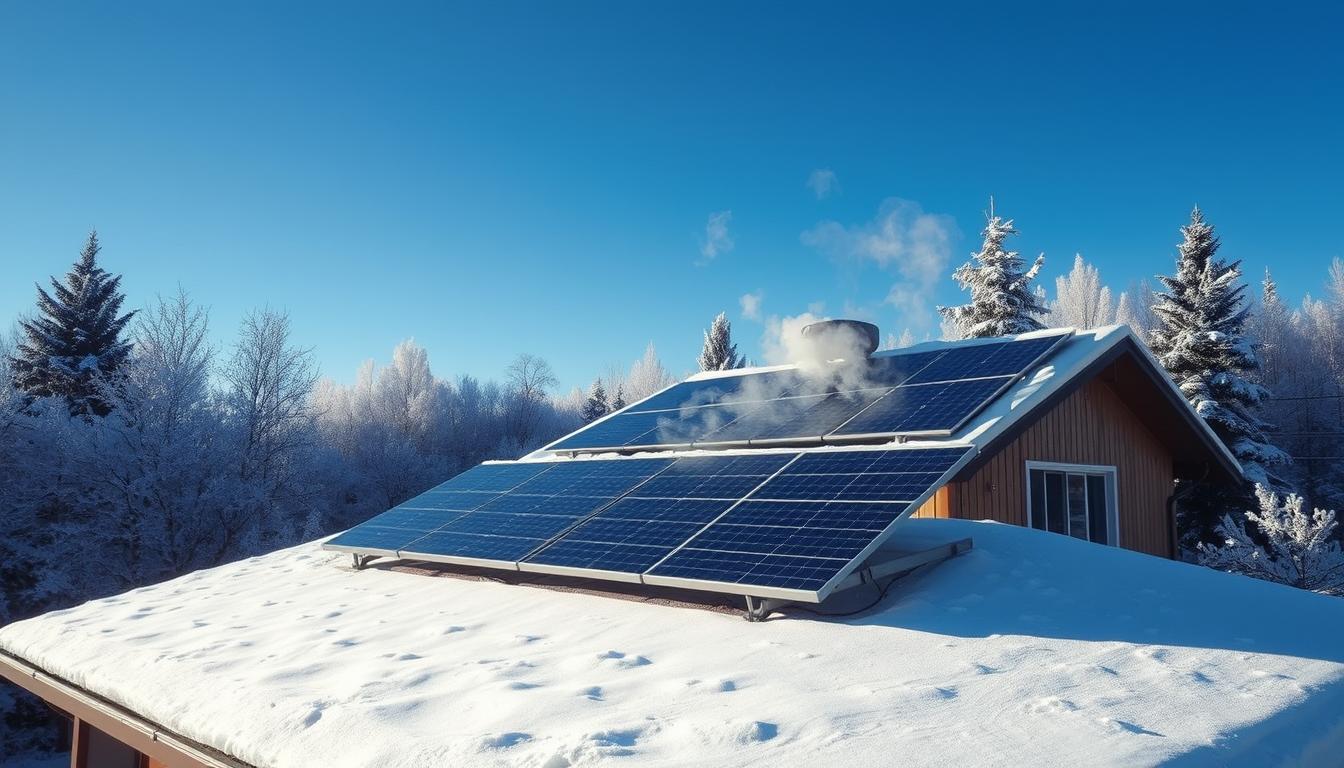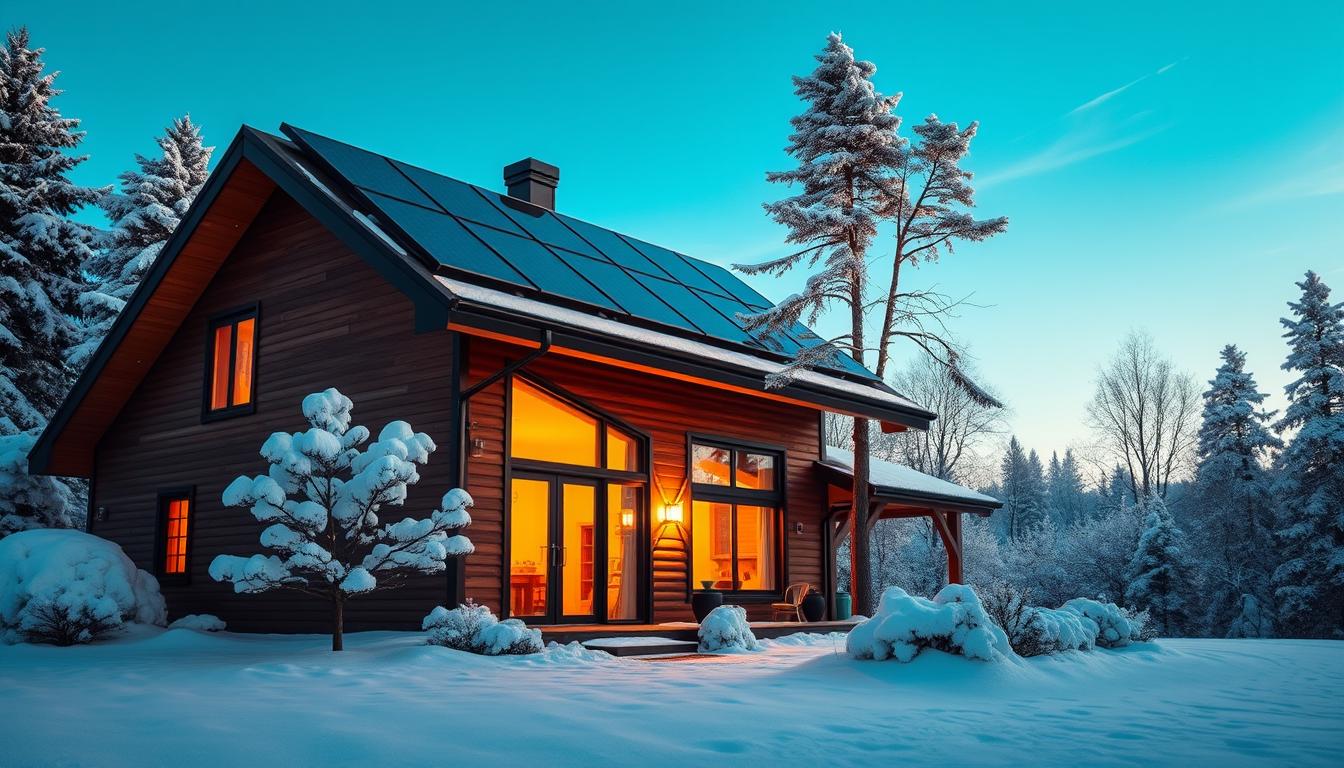Solar Water Panels: Heat Your House in Winter
Winter is coming to India, and people want to stay warm. Solar water panels are a new way to heat homes. Rajesh Patel in Ahmedabad tried them on his roof to fight the cold.
Rajesh wondered if solar energy could warm his home in winter. He looked into solar water panels and liked what he saw. He wanted to use less energy and help the planet.
Solar water panels turn sunlight into heat. This heat warms the water in the system. Then, this warm water heats the home, making it cozy.
Rajesh found out solar panels could keep his home warm all winter. They use the sun’s power, not fossil fuels. This saves money and is good for the Earth.
Key Takeaways
- Solar water panels can be a viable option for heating homes during the winter months in India.
- The technology converts the sun’s energy into heat, which can then be used to power a home’s central heating system.
- Proper installation and maintenance are crucial for optimizing the performance of solar water panels in cold weather conditions.
- Using solar water panels can help reduce a homeowner’s carbon footprint and save money on energy bills.
- Homeowners in India are increasingly exploring the benefits of solar water heating systems as a sustainable heating solution.
Understanding Solar Water Panels for Home Heating
Solar water panels are a new way to heat your home in winter. They use the sun’s power to save money and help the planet. Let’s explore how they work and what types are out there.
Basic Components of Solar Water Heating Systems
The core of a solar water heating system is the solar collectors. They catch the sun’s energy and turn it into heat. These collectors have a dark plate, a clear cover, and insulation to keep the heat in.
The heated water goes through pipes and into an insulated tank. This tank keeps the water warm for later use.
How Solar Collectors Transform Sunlight into Heat
Turning sunlight into heat is easy and works well. When sunlight hits the dark plate, it turns into heat. This heat warms the water in the pipes.
This warmed water is then used for heating your home or for hot water.
Types of Solar Water Panels Available
- Flat-plate collectors: These are common and fit well on roofs.
- Evacuated tube collectors: They use glass tubes to keep heat in, great for cold places.
- Integral collector-storage systems: These are all in one, perfect for small homes.
Each solar water panel has its own benefits. They suit different homes and climates. Knowing your options helps pick the right one for your solar water heater performance, solar space heating, and passive solar design needs.
Can solar water panels heat a house in the winter?
When winter comes, people wonder if solar water panels can warm their homes. The answer is yes. But how well they work depends on several things.
The solar panel efficiency in cold weather is important. Solar panels work better when it’s cool. But less sunlight and snow on the panels can make things harder.
- Solar water panels can help with heating in winter. They can cut down on using old heating systems.
- How well they work depends a lot on the local weather. Some places do better than others.
- Keeping your home well-insulated and your panels in good shape is key. Also, working with your current heating system is important.
Solar water panels can’t heat a house all by themselves in very cold winter. But they can help a lot. Knowing how they work can make them more effective can solar water panels heat a house in the winter.
“Solar water panels can be a game-changer for homeowners looking to reduce their energy bills and carbon footprint, even in the winter months.”
To get the most out of solar water panels, you need to understand your local weather and heating needs. With the right setup, solar water panels can be a good and affordable way to heat your home in winter.
Benefits of Solar Water Heating Systems for Winter Use
When it gets cold, using solar water heating systems helps a lot. They save money and help the planet. They also make homes more independent from energy sources.
Cost Savings During Cold Months
Solar water heating systems save a lot of money in winter. They use the sun’s heat instead of electricity or gas. This means lower bills and more money in your pocket.
Environmental Impact and Sustainability
These systems are good for the planet. They use clean energy and don’t pollute. This helps make our homes and planet greener.
Energy Independence in Winter
Using solar water heating makes homes more independent. It means less worry about high energy prices. Your home stays warm and cozy, no matter what.
| Benefit | Description |
|---|---|
| Cost Savings | Reduce reliance on expensive traditional heating sources, leading to lower monthly utility bills. |
| Environmental Sustainability | Utilize a clean and renewable energy source, reducing carbon emissions and contributing to a greener future. |
| Energy Independence | Become less dependent on the grid or traditional heating sources, ensuring stable and reliable home heating. |
Indian homeowners gain three big benefits from solar water heating in winter. They save money, help the planet, and stay warm without worrying about energy costs. It’s a smart and green way to keep homes cozy.
Installing Solar Water Panels for Maximum Efficiency
To get the most out of solar water panels, you need to plan well. Where and how you put them matters a lot. This is especially true in winter when it gets cold.
Here are some important things to think about:
- Optimal Placement: Put your panels where they get the most sun. This is usually on the south side of your house, away from trees.
- Tilt and Orientation: Make sure the panels are at the right angle. This angle should match your location’s latitude, usually between 30-45 degrees.
- Integration with Existing Systems: Connect your solar system smoothly with your home’s plumbing and heating. This makes everything work better together.
By paying attention to these details, you can make your solar system work its best. This means you’ll have warm water all winter without spending a lot of money.
| Optimal Tilt Angle | Latitude |
|---|---|
| 30-35 degrees | 30-35 degrees North |
| 35-40 degrees | 35-40 degrees North |
| 40-45 degrees | 40-45 degrees North |
Getting your solar system installed right is very important. By following these tips, you can have warm water all winter. And you’ll save money too.
Optimizing Solar Panel Performance in Cold Weather
Keeping solar panels working well in winter is very important. You can do this by using good insulation, taking care of your system, and protecting it from freezing. This way, your solar panels will keep giving you heat even when it’s cold.
Proper Insulation Techniques
Insulation is key to keeping solar panels efficient in cold weather. Here are some tips to help:
- Put high-quality insulation around the solar water storage tank and pipes to stop heat from escaping.
- Wrap exposed pipes with insulating wraps or jackets to stop them from freezing and keep the heat in.
- Make sure the solar panel enclosure is well-insulated to keep the heat from the collectors inside.
Maintenance During Winter Months
Keeping your solar water heating system in good shape is very important in winter. Here are some things to do:
- Remove snow and ice from the solar panels so they can get sunlight.
- Check the system for leaks or damage that could make it work less well.
- Make sure the antifreeze in the solar collector loop is at the right level to protect against freezing.
Preventing Freeze Damage
It’s very important to protect your solar water heating system from freezing in winter. Here are some ways to do it:
| Technique | Description |
|---|---|
| Drain-Back Systems | These systems drain the water from the solar collectors when the pump stops, so it doesn’t freeze. |
| Glycol-Based Antifreeze | Using a glycol-based antifreeze in the solar collector loop keeps it from freezing. |
| Backup Heating Elements | Adding backup heating elements to the solar water storage tank keeps the temperature right during very cold times. |
By focusing on insulation, regular maintenance, and preventing freezing, you can make your winterizing solar hot water systems work better. This way, your solar panel efficiency in cold weather will stay high all winter.
Integrating Solar Water Panels with Existing Heating Systems
Homeowners are looking into solar space heating and residential solar thermal systems. It’s important to blend these new systems with what they already have. This helps keep homes warm all winter.
Hybrid Heating Approaches
Using a hybrid system is a smart move. It mixes solar panels with a traditional heater. This way, homes get free solar energy and a backup when needed.
Optimizing Solar Integration
It’s key to check if solar panels fit with the current heating setup. You might need to change some plumbing or add new parts. This makes sure the solar system works its best.
Maximizing Winter Efficiency
In winter, solar panels need to work extra hard. You can place panels better, add insulation, and clean them often. This helps them work well even when it’s cold.
Adding solar panels to your heating system is a great idea. It lets you use clean energy and keeps your home cozy. By mixing solar and traditional heating, you save energy and help the planet.
Common Challenges and Solutions for Winter Operation
When it gets colder and snow falls, solar water panel owners in India might face some problems. But, with the right steps and planning, these issues can be solved.
Dealing with Snow Accumulation
Snow on solar panels is a big worry in winter. It blocks sunlight, making the system less effective. To fix this, it’s important to clear the snow off the panels.
People can use special tools or get help from pros to keep the panels clean. This way, they can still catch the sun’s rays well.
Addressing Reduced Sunlight Hours
Winter brings shorter days and less sunlight. This can make the system work less well. To improve, homeowners might need to adjust the panels’ tilt.
Also, getting a solar tracking system is a good idea. It changes the panel’s direction to catch more sun.
Backup Heating Options
Solar panels help a lot in winter, but they might not be enough. It’s smart to have a backup heat source, like a furnace or wood stove. This ensures warmth all winter.
FAQ
Can solar water panels heat a house in the winter?
Yes, solar water panels can heat a house in winter. They use the sun’s energy to warm water. This water is then used for heating and hot water.
Even in cold weather, these systems can help a lot. They work best when set up right.
How do solar water panels work for home heating?
Solar water panels soak up the sun’s energy to heat water. This warm water is then used to heat your home.
They have solar collectors, a tank, and a pump. These parts work together to turn sunlight into heat.
What are the benefits of using solar water panels for winter heating?
Solar water panels save money and are good for the planet. They cut down on energy bills in winter.
They also make your home more independent from the grid. This is good for the environment.
How can I maximize the efficiency of solar water panels in cold weather?
To get the most from solar panels in winter, do a few things: 1. Insulate the collectors, tanks, and pipes well. This keeps the heat in. 2. Protect the system from freezing when not in use. This saves money on repairs. 3. Clean and check the panels and parts often. This keeps them working well. 4. Use a backup heating system when the sun isn’t enough. This ensures you always have heat.
How do I integrate solar water panels with my existing home heating system?
To connect solar panels with your heating system, link the solar-heated water to your home’s heating. Use a heat exchanger for this.
This way, the solar system helps your main heating. It cuts down on energy use and costs in winter.
Akash verma s blog, where curiosity meets creativity! Sanjeet is a dedicated blogger with a passion for exploring diverse topics, from travel and technology to personal development and lifestyle. With a unique voice and engaging storytelling, he shares insights, experiences, and tips that inspire his readers to embrace life’s adventures.



